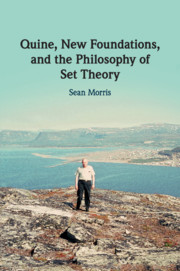
-
Select format
-
- Publisher:
- Cambridge University Press
- Publication date:
- 13 December 2018
- 13 December 2018
- ISBN:
- 9781316591321
- 9781107152502
- 9781316606636
- Dimensions:
- (228 x 152 mm)
- Weight & Pages:
- 0.47kg, 240 Pages
- Dimensions:
- (229 x 152 mm)
- Weight & Pages:
- 0.33kg, 220 Pages
- Subjects:
- Mathematics, History of Mathematics, Logic, Philosophy
You may already have access via personal or institutional login- Subjects:
- Mathematics, History of Mathematics, Logic, Philosophy
Book description
Quine's set theory, New Foundations, has often been treated as an anomaly in the history and philosophy of set theory. In this book, Sean Morris shows that it is in fact well-motivated, emerging in a natural way from the early development of set theory. Morris introduces and explores the notion of set theory as explication: the view that there is no single correct axiomatization of set theory, but rather that the various axiomatizations all serve to explicate the notion of set and are judged largely according to pragmatic criteria. Morris also brings out the important interplay between New Foundations, Quine's philosophy of set theory, and his philosophy more generally. We see that his early technical work in logic foreshadows his later famed naturalism, with his philosophy of set theory playing a crucial role in his primary philosophical project of clarifying our conceptual scheme and specifically its logical and mathematical components.
Reviews
‘Sean Morris's book fills a heretofore gaping hole in our understanding of the origins and history of set theory, explaining how Quine's New Foundations is not the isolated, idiosyncratic system it is sometimes taken to be, but is instead deeply connected - historically, philosophically, and mathematically - to other, now more mainstream, accounts of the nature of sets.'
Roy T. Cook - University of Minnesota, Twin Cities
Contents
Metrics
Altmetric attention score
Full text views
Full text views help Loading metrics...
Loading metrics...
* Views captured on Cambridge Core between #date#. This data will be updated every 24 hours.
Usage data cannot currently be displayed.
Accessibility standard: Unknown
Why this information is here
This section outlines the accessibility features of this content - including support for screen readers, full keyboard navigation and high-contrast display options. This may not be relevant for you.
Accessibility Information
Accessibility compliance for the PDF of this book is currently unknown and may be updated in the future.


